Dental Implants Lancaster
Achieve Lifelong Results with Expert Implant Placement
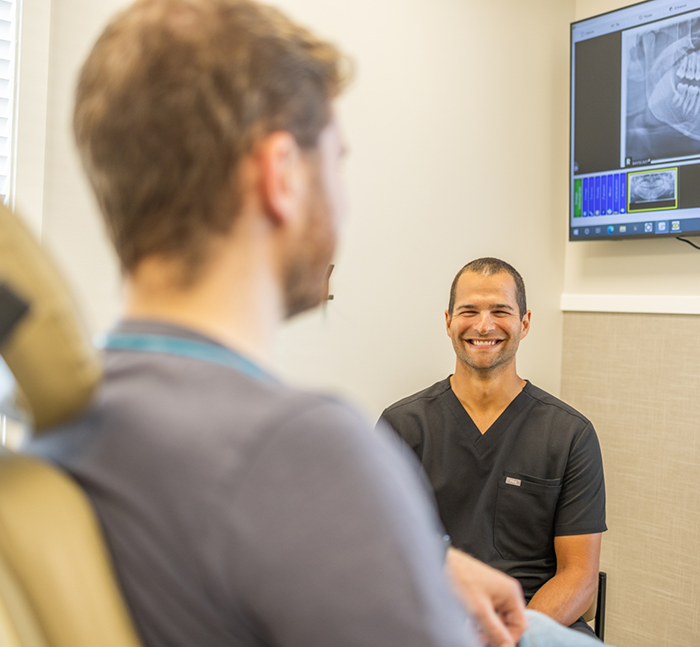
When considering dental implants, it is crucial to choose a qualified surgeon for your placement. Our oral surgeons have undergone extensive training in the field of implant planning and placement, ensuring optimal results for our patients. In addition, all of our doctors continue to expand their knowledge with numerous hours of continuing education in the field of implant dentistry each year. Equipped with the latest technology and techniques, we excel in handling both simple and complex cases, including those requiring bone grafting or sinus augmentation. Our numerous years of experience allow us to manage potential complications and also provide long-lasting outcomes. Contact our Conestoga Oral Surgery team today to schedule your consultation and start your journey toward a confident smile with dental implants in Lancaster.
Why Choose Conestoga Oral Surgery for Dental Implants?
- Our Experienced Doctors Place Thousands of Dental Implants Each Year
- Enjoy Peace of Mind With Our Comprehensive Implant Warranty
- We are the Leading Oral Surgery Practice for Implant Dentistry In Central Pennsylvania Since 1985!
What Are Dental Implants?
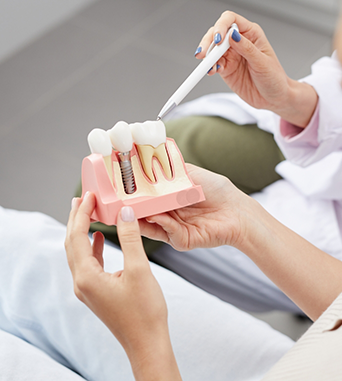
Dental implants are made of a titanium alloy and are often referred to as a “screw” that is placed into the jawbone to replace missing teeth. Titanium is a material that is well-accepted by the body and is similar to the material used for patients that have orthopedic joint replacements. These small posts stimulate the jaw when chewing, preventing bone loss, and fuse with the bone through a process called osseointegration. The procedure is often completed using local anesthesia (numbing injections) and is a relatively quick procedure that can be completed in less than 20 minutes.
The recovery after dental implant surgery is also surprisingly simple and straightforward. After several months of healing, patients return to their general dentist to attach restorations such as crowns, bridges, and dentures to the implants. Implants replace natural teeth in both function and appearance, and their durability make them a popular long-term solution for tooth loss when properly cared for.
The 4-Step Dental Implant Process
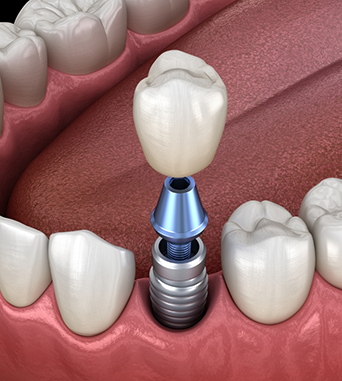
- Consultation: At your initial visit, we will obtain X-rays to create a detailed treatment plan and confirm your candidacy for dental implants. Our cone beam CT scanner provides precise 3D images for treatment planning. We will collaborate with your restoring doctor in the planning process and tailor the treatment to meet your needs, considering factors such as medical history and bone adequacy.
- Implant Surgery: Your procedure may involve multiple stages, including extraction and bone grafting if necessary. We employ cutting-edge technology like our TRIOS intraoral scanner for creating static guides and the X-Guide® surgical system for precise implant placement. The surgery is relatively painless, with most patients experiencing minimal disruption to their daily routines. At this stage, you’ll have a gap where your tooth is missing, but a removable appliance such as a partial or flipper can be used for appearance if desired.
- Healing & Osseointegration: Following your implant surgery, a 3-4 month healing period allows implants to fuse with your jawbone through a process called osseointegration. You’ll return for a checkup to ensure you’re ready for restoration by your general dentist for eventual placement of a permanent crown, bridge, or denture.
- Restoration: Once cleared for restoration, you’ll visit your dentist to have the crown or prosthesis fabricated and inserted. With proper care, your restored implants can last a long time.
For most patients, the process of implant placement to eventual restoration by the general dentist takes approximately 4-7 months, which is dependent on several factors that will be discussed with you at your consultation. It is a relatively painless procedure, and many patients experience minimal disruption to their daily life activities. Once the implants are restored with crowns, a bridge or fixed prosthesis, they should be cleaned just like your natural teeth. With proper care, they can last a long time.
Benefits of Dental Implants

- Prevents bone resorption and deterioration, preserving natural facial structure and eliminating wrinkles caused by missing teeth.
- Dental implants function, feel, and look like natural teeth, providing a long term permanent replacement solution.
- Unlike traditional bridges, implants do not require any alteration of neighboring teeth.
- Implants make it easier to chew and digest food properly, promoting overall good health and nutrition.
- Eliminates the discomfort and pain associated with loose-fitting partials and dentures.
- With a natural look and feel, implants can improve self-esteem and confidence.
- Implants prevent slurred speech or lisps caused by missing teeth or ill-fitting dentures.
Dental Implant Post-Op Instructions

Conestoga Oral Surgery patients can rest easy knowing that their implant placement is being handled by a highly skilled oral surgeon, as our team features many who have several years of experience and countless hours of continuing education dedicated to implant dentistry. Naturally, most people are curious about the healing process and how it may affect their daily routines, so click the button below to learn exactly what to expect.
What to Do Directly After Dental Implant Surgery

In simple terms, the best thing you can do right after getting dental implants in Lancaster is take it easy. This helps protect the implant site, as limiting movement encourages clotting, which shields the area and promotes successful fusion between the bone and implant post.
Common Side Effects When Recovering from Dental Implant Placement

Mild soreness, slight bleeding, and swelling are all normal parts of the healing process after dental implant placement. These symptoms usually subside quickly and are manageable. While prescription pain relief may be offered, many patients find that over-the-counter medications are more than sufficient. If your pain seems to be getting worse after a few days, or if you have a fever, you should reach out to your dental implant surgeon in Lancaster, as these could be signs of complications.
Your Diet After Dental Implant Surgery

Preparing your kitchen ahead of time with soft, easy-to-eat foods can make recovery more comfortable. You’ll want to avoid anything crunchy or chewy for a few days. Some great go-to options include:
- Oatmeal
- Sugar-free yogurt
- Smoothies or shakes (avoid using a straw)
- Scrambled or soft-boiled eggs
- Soft pasta
- Broth-based or creamy soups
- Pudding
Post-Op Health & Oral Hygiene

Depending on how many implants you receive, you may be able to resume gentle brushing the same evening—just steer clear of the surgical area. If multiple implants were placed, saltwater rinses are a safer bet at first. Be very gentle, and instead of spitting, let the liquid fall from your mouth naturally. Forceful spitting can interfere with blood clotting and delay healing.
Maintaining & Caring for Your Dental Implants

Our team will take every possible step to ensure that the dental implant process goes as smoothly as possible. That said, once your dental implants have healed, taking care of them is the responsibility of the patient. It will be up to you to give your new smile the maintenance required for long-term success. Below, you’ll find a list of suggestions to make sure that your dental implants stay in excellent condition.
Make Oral Hygiene a Priority

If the bacteria in your mouth accumulate, it can cause detrimental effects to your implants, leading to failure. Fortunately, you can minimize the chances of this happening by practicing thorough, daily oral hygiene. Be sure to continue to brush your teeth twice a day, and don’t forget to clean the area around your dental implants as thoroughly as possible. Be sure to floss and rinse with ADA-approved mouthwash as well in order to keep harmful oral bacteria under control. Just because dental implants can't get cavities doesn’t mean they don’t require as much, if not more, cleaning than your natural teeth.
Eat a Healthy Diet

Excessive consumption of sugary and starchy foods can leave you more susceptible to oral health issues that can put dental implants at risk. Meanwhile, a balanced diet that includes plenty of fruits, vegetables, dairy products, and lean proteins can improve the health of the gum tissue responsible for protecting your dental implants. Think carefully about what you eat and the impact it can have on your rebuilt smile.
Break Bad Habits

There are several oral habits that can compromise the long-term success of dental implants, including:
- Smoking, vaping, and other tobacco products.
- Biting on fingernails or the ends of pens, pencils, or toothpicks.
- Using your teeth to tear open packages.
- Chewing ice, peppermints, and other overly hard foods.
The sooner you break these habits, the easier it will be to keep your dental implants and the crowns attached to them safe from unnecessary damage.
Protect Your Dental Implants From Trauma

If you have TMJ pain or sore jaw muscles early in the morning, you could be grinding and clenching your teeth at night without realizing it. This could eventually cause serious damage to your dental implants. To keep your newly rebuilt smile safe, you can ask your regular dentist about getting a nightguard.
On top of that, you should make sure that your dental implants are always properly protected while playing contact sports. Even if you aren’t required to wear an athletic mouthguard, it’s better to do so anyway, just in case you unexpectedly get hit in the mouth.
Schedule Regular Dental Checkups

Dental implants may not be real teeth, but they can still benefit from routine preventive care and monitoring. To that end, be sure to pay your general dentist a visit every six months. They can check to make sure that your dental implants are in good shape and can identify any problems that might be developing. Finding and addressing the small issues as early as possible can go a long way toward maximizing the lifespan of your dental implants. Your general dentist and oral surgeon are a great resource for any other questions you may have.
Full Mouth Rehabilitation
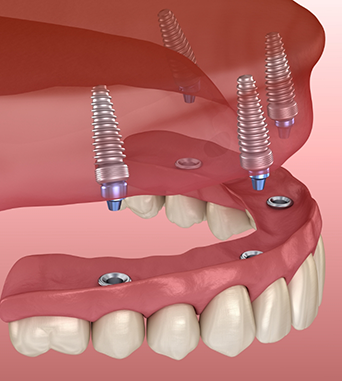
There are times when patients have a failing dentition, numerous missing teeth, or use removable partials/dentures, which can all lead to frustration and loss of confidence. Today, with modern implant dentistry techniques, you can regain a fully functional smile in record time with Teeth-in-a-Day surgery. This revolutionary surgery utilizes the latest in technology to place implants and restore with fixed bridges within as little as 24 hours. This surgery is completed while you are asleep in our state-of-the-art operating room under the care of your surgeon and an anesthesia provider.
Learn More About Full Mouth Rehabilitation
Bone Grafting
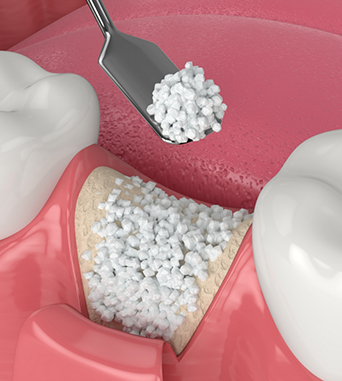
At your dental implant consultation, your oral surgeon may recommend bone grafting at the time of an extraction or to rebuild an area where there is insufficient bone. For example, patients who have suffered from missing teeth for quite some time experience bone loss due to a lack of stimulation to the area. As a result, the bone will deteriorate, which may, in turn, affect a patient’s replacement options. In this case, preliminary surgery with bone grafting may be required to help reconstruct the missing bone so a patient can undergo eventual dental implant placement. There are many types of grafting that can be utilized, and this will be discussed during your first visit with us. Our cone beam CT scanner is used to determine a patient's bony anatomy and determine the need for grafting prior to implant placement.
Advanced Technology: X-Guide™ 3D Navigation
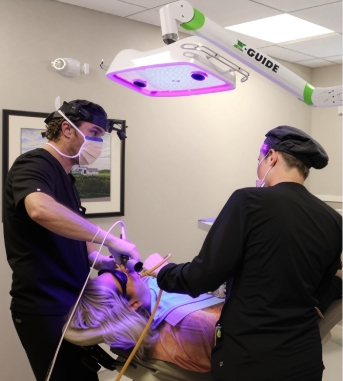
X-Guide™ is a state-of-the-art 3D navigation system that works like GPS for your dental implants. It gives your surgeon real-time control and visibility during surgery, enhancing accuracy and patient outcomes.
Using detailed CBCT scans, X-Guide helps us plan the optimal position, angle, and depth of each implant before surgery. During the procedure, it provides live navigation to make micro-adjustments as needed. This results in:
- Minimally invasive surgery
- Shorter recovery time
- Fewer complications
- Highly accurate and aesthetic implant placement
Whether you're receiving a single implant or undergoing full-arch restoration, X-Guide technology supports a safer, more comfortable experience and long-lasting results.
Sinus Lift

During your dental implant evaluation, your oral surgeon may determine that a sinus lift is necessary to create adequate bone support in the upper jaw (maxilla) for implant placement. Since the sinus cavities occupy much of the space above the upper, back teeth, and bone often shrinks after tooth loss, there may not be sufficient height to place an implant securely in the bone. A sinus lift or “sinus bump” involves carefully elevating the sinus membrane and placing bone grafting material beneath it to build up the necessary space. This ensures a strong, stable foundation for your future implant(s).
Frequently Asked Questions About X-Guide™
How does X-Guide differ from traditional implant surgery?
Traditional implant surgery relies on manual placement or pre-made static guides, while X-Guide uses live 3D navigation during the procedure to give your surgeon greater control and precision at every step.
Is X-Guide Safe?
Yes. X-Guide is FDA-cleared and widely used by oral surgeons for its ability to improve accuracy and minimize surgical trauma.
Will using X-Guide make my procedure longer?
Not at all. In fact, the added precision can streamline the process, and patients often experience faster healing due to the minimally invasive nature of the surgery.
Is X-Guide right for all implant patients?
X-Guide is highly versatile and can be used for everything from single implants to full-arch restorations. During your consultation, we’ll determine if it’s the right fit for your treatment plan.
Dental Implant Frequently Asked Questions
How long does it take to recover from dental implant surgery?
There are a few different stages when it comes to recovery after dental implant surgery. The first 24-72 hours are the most crucial, as this sets the stage for the surgery site(s) to heal. Most patients experience mild swelling, soreness, or bleeding during this period, but these symptoms are easily managed with OTC medication. Taking it easy and refraining from strenuous physical activity during this period can shorten this initial stage.
Over the next three to six months is when osseointegration takes place, when the implant post(s) bonds with the surrounding bone. Your mouth should feel normal after a week or so, but it’s important to practice consistent oral hygiene around the implant site and maintain follow-up dental appointments to ensure this process goes smoothly.
Will I need to take time off work after having dental implants placed?
This largely depends on how many implants were placed and the nature of your occupation. The more posts you receive in a single procedure, the more time your body will need to heal. For most patients, avoid strenuous physical activity for a day or two after your surgery. Your oral surgeon at Conestoga Oral Surgery will discuss these details with you ahead of the surgery so you know what to expect and can plan accordingly.
Are there any foods I shouldn’t eat with dental implants?
One of the best aspects of getting dental implants in Lancaster is that they enable patients to eat pretty much anything they want after healing is complete. In general, it’s advised to be mindful when biting into particularly hard or sticky foods—this is wise whether you have implants or not!
Patients are also asked to avoid chewing on non-food items like ice, fingernails, pens, pencils, etc., as this can wear down the restoration and put pressure on the post itself to the point of compromising its stability.
When can I drink coffee after having dental implants placed?
You should ideally avoid hot coffee during the first 24-48 hours after your procedure. A lukewarm or iced beverage is fine. It’s best to wait a couple of days because caffeine can increase your heart rate and blood pressure, adversely contributing to post-treatment bleeding and swelling, and excess heat can irritate the surgery site.
